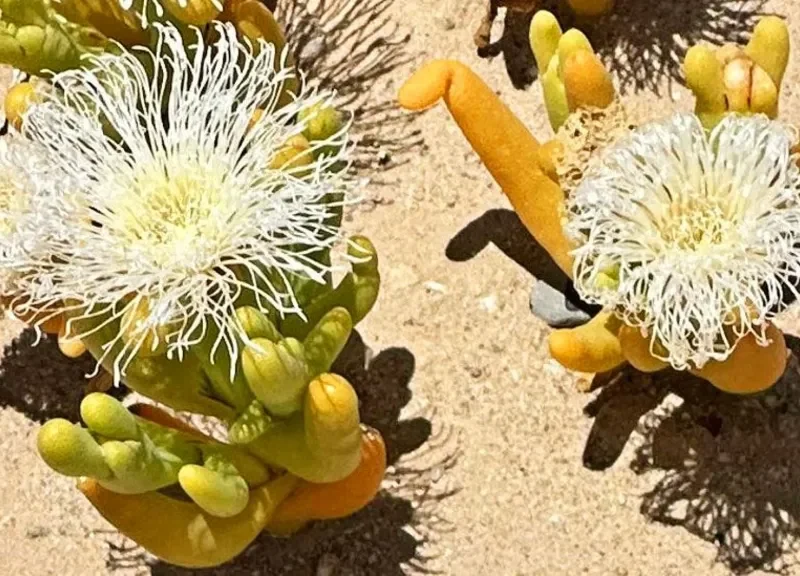A remote biodiversity hotspot in South Africa has become a center for the illegal trade of protected plant species, with organised crime groups exploiting overseas demand.
“They’ve not just stolen our land or plants, they’ve stolen our heritage too,” a livestock farmer expressed in frustration to the BBC, highlighting the social and ecological damage caused by poaching.
The primary target is a variety of succulent plants, known for their ability to store water and thrive in dry climates. Many species of these succulents are endemic to the Succulent Karoo desert, which spans South Africa and Namibia. These plants vary in size, shape, and color—ranging from small, multi-colored buttons to cactus-like forms that bloom with vibrant flowers.
While these succulents can be grown in nurseries, global demand is driving poaching, with plants being illegally harvested from the wild, smuggled, and sold online to buyers in the US, Europe, and East Asia.
In Kamieskroon, a small town in South Africa’s Namaqualand region, poaching has become rampant in the rolling hills. Some species are so localized that even minimal poaching can lead to their extinction.
“In South Africa, we already know of seven species that have been wiped out completely, and others are likely to follow soon,” said Pieter van Wyk, a nursery curator at /Ai /Ais-Richtersveld Transfrontier Park.
While it’s difficult to obtain exact figures on the scale of poaching, a report by the NGO Traffic revealed that 1.6 million illegally harvested succulents were seized by South African authorities between 2019 and 2024, with the true number likely far higher.
The South African government is taking action, having launched a strategy in 2022 to combat poaching, which includes community programs aimed at raising awareness about environmental protection.

Namaqualand is home to a vast diversity of succulent plants, with around 3,500 species estimated to thrive in the region.
According to Mr. Van Wyk and other conservationists, plant poaching in Namaqualand has surged since the Covid-19 lockdown in 2020. With international traders unable to travel to South Africa, they turned to local people to collect succulents and ship them overseas.
Mr. Van Wyk attributes this to a rise in global demand, explaining, “People had more time to find something to occupy themselves with, and plants were one of the few things that could connect you to the outside world from within your home.”
Organized crime syndicates seized this opportunity, hiring poachers to collect wild plants, which are then marketed on social media and e-commerce platforms.
“The syndicates saw this as a chance to make something viral, promoting the message: ‘We have this super-strange looking thing from the African continent,'” says Mr. Van Wyk. “Then, the public gets excited and wants to buy it, and the syndicates arrange for the species to be poached.”
The increase in criminal activity has impacted local communities.
“This is a low-income area, and people will take advantage of income opportunities,” explains Malinda Gardiner from Conservation South Africa.
A local livestock farmer, who spoke to the BBC on condition of anonymity for fear of retaliation, also noted the surge in money during poaching incidents. “When we see young men going up into the mountains, we know they’re poachers,” she says. “They use screwdrivers to uproot succulents and carry backpacks and sacks to transport the stolen plants.”

Conservationists say wild succulents should not be bought online
A few days later, an outbreak of binge drinking and illegal activities occurs.
“When people get the money, it leads to more drugs, alcohol, and neglect of children because their parents are intoxicated and there’s no food,” Ms. Gardiner explains.
She fears that these tensions will have lasting impacts. “Small communities here really rely on each other, but this creates distrust and divides them,” she adds.
Mr. Van Wyk’s view is more severe: “People are being exploited and trapped by syndicates and buyers.”
Efforts are underway to raise awareness among buyers about the importance of knowing where a plant comes from.
In recent years, China has become a major market for wild succulents, but an online campaign there to educate people about the illegal trade has shown positive results.
Launched in March 2023 by the China Biodiversity Conservation and Green Development Foundation, the Clean Internet for Conophytum campaign has led to an 80% drop in online ads for conophytum succulents with uncertain origins. Buyers are beginning to inquire about the source of plants sold online.
“The key is awareness,” says Linda Wong, the foundation’s deputy secretary-general. “Once people know, they want to act. They want to responsibly enjoy these plants.”
Conservationists urge consumers worldwide to ask about the origin of plants and never buy those advertised as wild.











